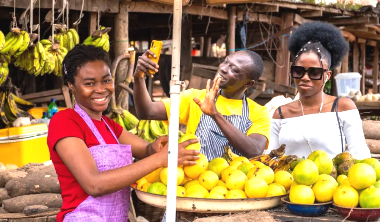By Nana Theresa Timothy
In Nigeria’s rapidly evolving fintech ecosystem, a new player is emerging with a bold mission to serve the millions of unbanked and underserved citizens often left behind by mainstream financial institutions. MyAjia, founded by Che Dilas Yusuf, is positioning itself as a financial solution tailored to market women, farmers, and small business owners who form the backbone of Nigeria’s economy but remain excluded from digital finance.
RELATED:E-commerce landscape in Africa: Trends and Insights
Features of MyAjia
The features of MyAjia includes;
- Easy Payments – Pay via QR, account number, phone, or email.
- Card Options – RFID and virtual cards for non-smartphone users.
- MyAjia Store – Simple online shops for SMEs.
- Agent Support – Local agents for onboarding and training.
- AI Multilingual Support – Hausa, Igbo, and more.
- Secure Transactions – Multiple security layers with bank partners.
- Physical Presence – Office and community outreach.
- SME Growth Tools – Marketing and product promotion support
Targeting the Forgotten Demographics
According to Dilas, the core vision of MyAjia is simple yet ambitious: to close the financial gap for people who traditionally lack access to banking services. These include farmers, market women, and small vendors, demographics that contribute a high percentage of Nigeria’s GDP.
When you go to buy yam from a local farmer, chances are that she doesn’t have an account number, These are the gaps we’re bridging. Many fintech companies focus on urban populations, but we are tailoring solutions for the overlooked.” Dilas explained
By addressing this demographic, MyAjia hopes to unlock economic growth at the grassroots level, making digital finance more inclusive.
Seamless Transactions with QR and Card Technology
While the Nigerian fintech scene is already crowded with payment solutions, MyAjia sets itself apart through its emphasis on simplicity, speed, and accessibility.
Our technology integrates QR codes and account numbers, so a customer can either transfer directly or simply scan a QR code to complete a transaction,”
Dilas said. Transactions can also be initiated with a phone number or email, minimizing complexity for users.
Security remains a top priority. MyAjia has established multiple security layers in its infrastructure and is currently finalizing partnerships with banks such as SquadCo by GTB and Safe Haven Micro Finance Bank to reinforce trust.
In addition, MyAjia is exploring RFID cards and virtual cards for users who may struggle with smartphones. This ensures even first-time digital users can make payments seamlessly, with support from MyAjia’s network of field agents.
E-Commerce as a Service: A Game-Changer for SMEs
One of MyAjia’s most innovative offerings is e-commerce as a service (EaaS), launched under the sub-brand MyAjia Store.
During interactions with customers, Dilas and his team noticed that many small business owners—boutique operators, market vendors, and artisans wanted an online presence but were deterred by the high cost of building and managing websites.
“We asked, how about we give them a simple tool to set up their own online store without heavy expenses?” Dilas said. “That’s how MyAjia Store was born.”
Through a subscription model, entrepreneurs can create online shops, list products, and accept payments directly, without worrying about technical barriers. MyAjia also plans to extend marketing support to help these SMEs advertise their goods, further boosting their reach.
We’re not just building e-commerce as a service, We’re building a community of SMEs, MSMEs, and the underserved. As they win, we also win, Dilas emphasized.
Physical Presence and Human Touch
Although MyAjia is primarily a digital platform, Dilas understands that many of their target users still value face-to-face interactions. To address this, the startup maintains a physical office at the Kefiano Creative Hub, Opposite Secretariat Junction in Jos.
Moreover, MyAjia has deployed a network of trained agents stationed in local markets and communities. These agents not only help customers register but also provide financial literacy training, workshops, and live demos of the platform.
“Our approach is peer-to-peer marketing,” Dilas explained. “The agents meet them directly, explain what MyAjia is about, and guide them through. We’re also issuing QR code cards to make adoption smoother.”
This blend of technology and human interaction ensures MyAjia’s model is accessible to people who may not be tech-savvy.
Leveraging Emerging Technologies
Looking ahead, MyAjia plans to leverage two transformative technologies: AI and e-commerce innovation.
The startup is already experimenting with AI-powered multilingual support, tailored to local languages such as Hausa and Igbo. This is designed to make the platform more inclusive for non-English speakers.
Most of our users are Hausa-speaking, and some have little or no knowledge of English, We are building AI models to bridge that communication gap so they can interact with MyAjia in their own language.” Dilas said.
The company also sees e-commerce as a service as a long-term growth driver, particularly as more Nigerians embrace digital transactions.
The Road Ahead
Nigeria’s fintech landscape is bustling with innovation, but Dilas believes MyAjia’s grassroots focus gives it a unique edge. By targeting communities that have been largely ignored by mainstream players, the company hopes to not only expand financial inclusion but also stimulate broader economic development.
“We’re not just a fintech platform,” Dilas concluded. “We’re building financial confidence for the underserved, one transaction at a time.”
As MyAjia scales, it will be closely watched by both investors and policymakers eager to see how technology can unlock opportunities for Nigeria’s vast unbanked population.






























